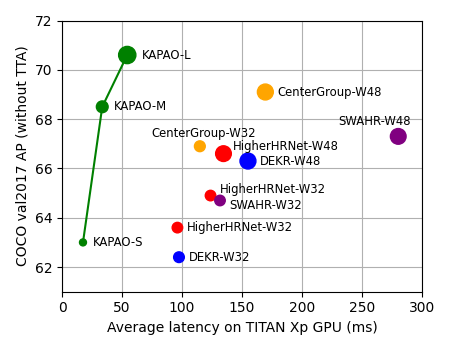Rethinking Keypoint Representations: Modeling Keypoints and Poses as Objects for Multi-Person Human Pose Estimation
In keypoint estimation tasks such as human pose estimation, heatmap-based regression is the dominant approach despite possessing notable drawbacks: heatmaps intrinsically suffer from quantization error and require excessive computation to generate and post-process. Motivated to find a more efficient solution, we propose to model individual keypoints and sets of spatially related keypoints (i.e., poses) as objects within a dense single-stage anchor-based detection framework. Hence, we call our method KAPAO (pronounced "Ka-Pow"), for Keypoints And Poses As Objects. KAPAO is applied to the problem of single-stage multi-person human pose estimation by simultaneously detecting human pose and keypoint objects and fusing the detections to exploit the strengths of both object representations. In experiments, we observe that KAPAO is faster and more accurate than previous methods, which suffer greatly from heatmap post-processing. The accuracy-speed trade-off is especially favourable in the practical setting when not using test-time augmentation. Source code: https://github.com/wmcnally/kapao.
PDF Abstract






 MS COCO
MS COCO
 CrowdPose
CrowdPose
